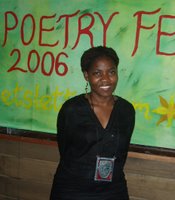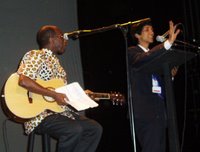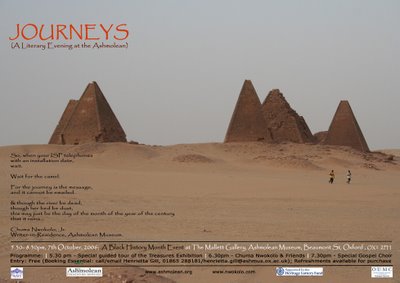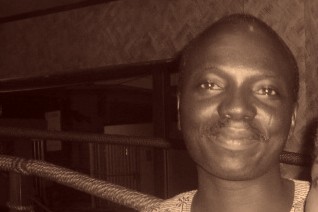Not the Wasted Generation
The importance of memoirs cannot be underestimated because they provide insights that sometimes cannot be found in history books. So memoirs are essential towards our understanding of a particular history, because of the knowledge, however little, they pass on. The German philosopher, Friedrich Nietzsche noted in 1873:
Every person and every people, according to its goals,
forces, and needs uses a certain knowledge of the past,
sometimes as monumental history, sometimes as
antiquarian history, and sometimes as critical history, but
not as a crowd of pure thinkers only watching life closely,
not as people eager for knowledge, individuals only
satisfied by knowledge, for whom an increase of
understanding is the only goal, but always only for the
purpose of living and, in addition, under the command
and the highest guidance of this life.
That need for understanding the past becomes all the more urgent for Nigerians whose nation’s history has thus far been anything but peaceful and successful. Nigeria continues to be a puzzle of underachievement, a conundrum of missed opportunities, a riddle of failures, an enigma of misplaced values, and a mystery of misused potentials and roads not taken.
Little wonder that at his 50th birthday anniversary in 1984, Akinwande Oluwole Soyinka, frustrated by the grip of hopelessness and despair on the nation, lamented that his "has been a wasted generation". But has it really been a "wasted generation" ?
You Must Set Forth At Dawn, Soyinka’s third memoir, following Ake:The Years of Childhood and the faction, Ibadan – The Penkelemes Years, provides an intriguing retraction of that famous phrase. At the end of what is easily his lengthiest and most fascinating book, a hefty 500 pages in the American edition sans pictures, appendix, and index, and an almost intimidating 626 pages in the Nigerian edition courtesy of the Ibadan-based Bookcraft, there is no evidence that his generation has been a wasted one.
Yes, the generation has not fulfilled the promise with which it emerged as the potential successor to the local leaders who had overseen the country’s transformation from a British colony to an independent state. But even as students of higher institutions in the United Kingdom, Soyinka and his colleagues could see the quality of leadership that the country was about to be blessed with.
The nationalists, the first-generation elected leaders and
legislators of our semi-independent nation, had begun to
visit Great Britain in droves. We watched their preening,
their ostentatious spending, and their cultivated
condescension, even disdain toward the people they
were supposed to represent. There were exceptions, but, in
the main, they did not appear to have emerged from the
land and people we had left behind when we journeyed out
to acquire some skills and learning. While we dreamed of
marching south to liberate Southern Africa, they saw the
nation as a prostrate victim to be ravished. (P. 48)
Contrast that with how this young generation saw itself:
We knew, beyond all doubt, our place within the evolving
organism of new nations. We, the young generation of that
independence phase, a renaissance people who would
transform the strange bequest into a world. The only way to
grasp this confidence, this self-assurance is to treat it as pure
knowledge. Not intuition, not revelation, not blind faith, not
ambition, not deductive reasoning or a conscious sense of
mission – no, simply as knowledge in its purest, unassailable
form. And we were working in our various fields – quite
indifferent to any special designation – to bring about this
renaissance. (P. 43)
That the renaissance has failed to materialise especially in Nigeria is not totally the fault of these purveyors of progress.
Soyinka’s account shows how the euphoria of Independence progressively turned into a cycle of bloodletting, rigged elections, coups, a civil war, and more coups. And yes, more of his generation gradually become part of the ruling establishment that leads the nation from one disaster to the other. But it is also his generation that sets the standard in various fields of human endeavour; standards that are yet to be surpassed, for instance, in the field of literature.
It is also his generation that has been at the forefront of opposing the variants of misrule that the country has experienced, with Soyinka himself becoming an arrowhead of sorts from the moment he daringly swops the tape of the recorded speech of the Premier of Western Nigeria with his own denouncing the rigged elections.
One shudders to think of what would have become of Nigeria if there had been no consolidated resistance to the various forms of misrule and tyranny that have been our lot since the Union Jack was lowered October, 1960. In one sense then, You Must Set Forth At Dawn is a tribute to the resistance that has ensured Nigeria has not gone down the drains. A resistance that has paid the price in many ways. But it is a passionate ode to steadfast, loyal and sacrificial friendship. The roles of his bossom friends especially Femi Johnson and Oyetunji Aboyade are crucial to several of his interventions in the nation’s political arena. Their loss is fittingly captured in this epic narrative. Indeed the tribute to Femi Johnson influences the structure of the memoir.
But this epic is more than a tribute. It also enables us understand and appreciate, and rightly so since it is through his perspective that the narration takes place, Soyinka as political motivator, activist, writer, hunter, wine connoisseur and noble Nobel laureate.
First, it is evident that the author is driven by the credo of justice. When the quest for justice possesses him, he undertakes highly risky ventures like going to negotiate the possibility of a truce on the Biafran side during the Nigerian Civil War, pleading a reprieve for Mamman Vatsa and other alleged coup plotters, or taking unorthodox and dangerous procedures of going into exile to escape Abacha’s murder squad. He puts everything into the resistance including the windfall from the Nobel Prize. This desire to see that justice is done propels him to intervene beyond the shores of Nigeria, to stop the bloodletting in South Africa or Northern Ireland.
Soyinka has an almost religious devotion to wine and hunting and several examples turn up frequently as attestation. Likewise, he recognises his limitations and would not be enticed into doing things he knows he does not have the capacity to deliver to the required standard. Soon after the demise of Abacha, he is courted by both Abdulsalami and a pressure group to consider taking over as the nation’s leader. He declines the offers and promptings even when there is a promise to bankroll his campaign if he accepts to contest:
My immediate objection was that I would not make
a unifying president. An influential caucus in the North-
a feudal elite whom I had never spared, and who in turn
had indoctrinated their constituency with the convenient
notion that I hated the North in its entirety – viewed me
with great suspicion. To make the ideal president, I would
first have to dismantle that lie, and that, I knew, would
require making undeserved concessions. (P.575)
Soyinka comes across as a pragmatist and this he exhibits in his religious syncretism as well as in his involvement with at least one or two military regimes. He justifies the latter thus:
It boils down, ultimately, to one’s personal confidence in
determining the length of spoon with which one dines with
the devil and one’s ability to keep a firm hold on it. This
involves deriving no advantages, no gains, no recompense
in the process – if anything, expending oneself both materially
and mentally for the attainment of a fixed and limited goal,
retaining one’s independence of action. Most deliciously
of all is the ability to walk away from the dinner table, flinging
a coin on to it as a tip for the host. (P. 215)
This justification for working with an Artful Dodger of a dictator will certainly make some wince and shake their head in total disapproval.
You Must Set Forth At Dawn is also a timely warning to Nigerians on the need to be alert, watchful and sensitive about the safety of democracy. It is a collective responsibility, the memoir strongly suggests, to ensure that the ethos of democracy is not hijacked and subverted by those who have self-serving and dictatorial tendencies and ambitions. As the nation’s history has shown, even within the scope covered by Soyinka’s account, each time democracy is undermined the task of restoration becomes more onerous, with greater sacrifices having to be made.
Although not directly stated, it is apparent that the effectiveness of the Resistance over the years has been hampered by lack of proper organisation and coordination. From the Third Force to the NADECO/NALICON era, the Resistance appears to limit itself to Lagos and some sections of the Southwest.
A major insight that this Soyinkan tome provides is that a lot of work needs to be done in the area of sorting out perceptions. There are still genuine fears within the ethnic entities of the nation. Unfortunately any dialogue that has taken place thus far seems to be only when a leader wants to manipulate the political process for a self-serving goal. Consequently the age-old fundamental concerns are given a cosmetic treatment.
In his portrayal of the various key players in Nigeria, Soyinka gleefully savages quite a handful even in the way he describes them. But the indictment of the quality of leadership Nigeria has had to put up with does not come directly from the Nobel laureate. As the black on black killings escalated in South Africa across political and ethnic lines, the danger of a civil war increasingly loomed on the horizon. Various efforts to solve the problem, including external interventions made virtually no headway, especially on the side of the African National Congress, as some hardliners would not allow for dialogue. Yet at some point Nelson Mandela and Chief Buthelezi, the Inkatha leader showed the true stuff of leadership:
The no-dialogue rhetoric continued for some months,
escalating in intensity even as the sheer statistics of
reprisal settled into a numbing spiral. Then one day,
several select assassinations and indiscriminate
massacres later, including the detonation of bombs at
political gathering, right on the heels of yet another
fire-breathing ANC bulletin that promised to wipe out
Inkatha and Inkatha’s like response, news emerged that
Nelson Mandela had quietly shunted aside his Executive
Committee and traveled out on his own to meet Buthelezi. (P. 323)
Of course, the consequence of that deft move was that South Africa pulled back from the brink of what would have been a tragic civil war.
You Must Set Forth AT Dawn comes to a tantalising end as Soyinka returns home from a physically, mentally and emotionally excruciating exile. This closure seems to indicate that Ogun permitting and without Esu intervening, another Soyinka memoir is very possible. This monumental, critical and perceptive account further proves that the Nobel Prize has been far from a "kiss of death" for Soyinka. Instead, like vintage wine, he is proving that with age even his accomplished standard of the mastery of language and its application to the public good can be surpassed.
- Emman Usman Shehu's review of You Must Set Forth At Dawn at its formal presentation in Abuja on Tuesday 5th September, 2006 at Shehu Musa Yar’Adua Centre. Quotes are from the Bookcraft edition.

 5). The Oil Lamp is a volume of poems on one theme only - environmental degradation in the Niger Delta.
5). The Oil Lamp is a volume of poems on one theme only - environmental degradation in the Niger Delta. 





















.jpg)




